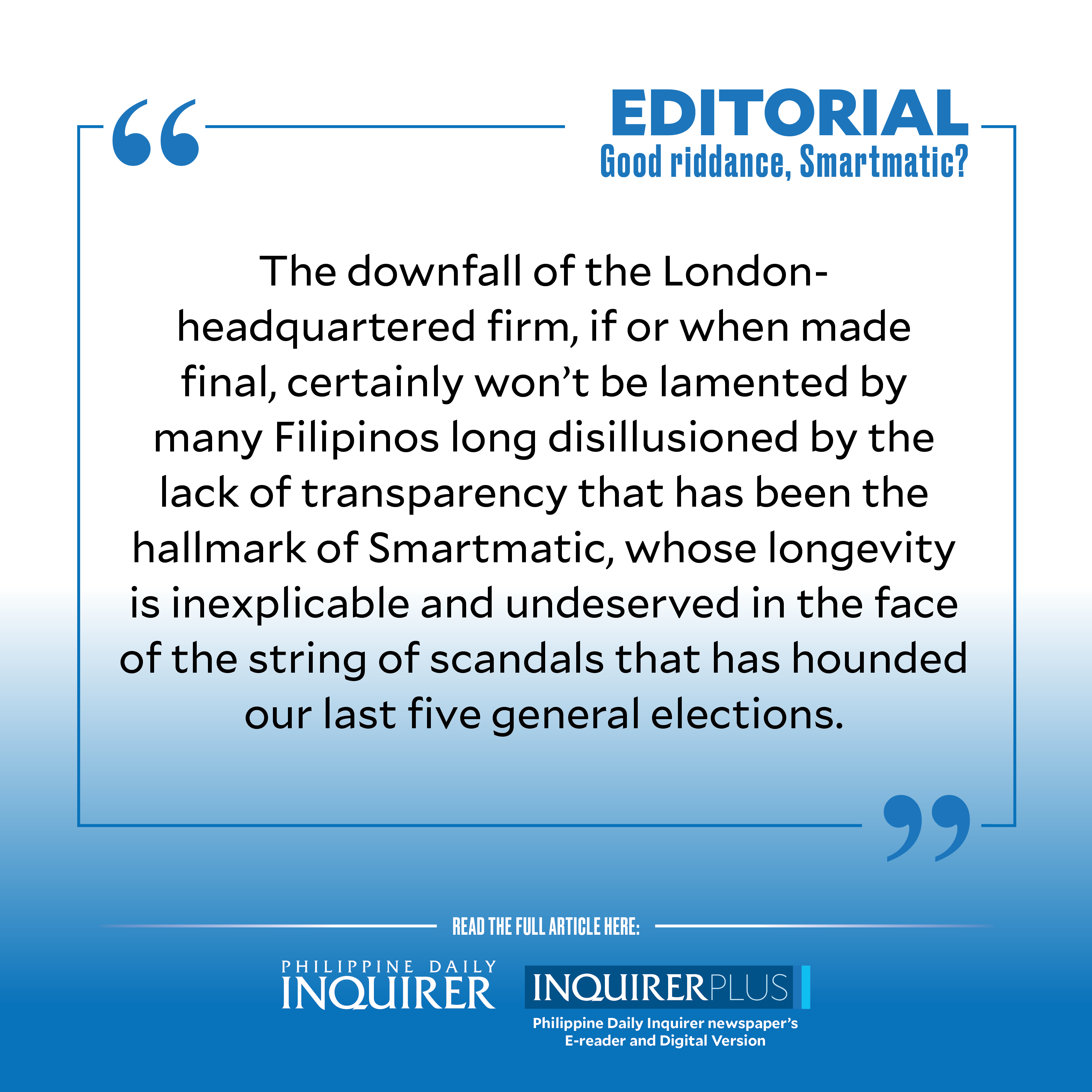Good riddance, Smartmatic?

Barring any intervention from the courts, the country’s voters may have seen the last of Smartmatic Philippines Inc., the electronic polling company that has monopolized our national elections since the switch to automation in 2010.
In an unprecedented show of political will, the Commission on Elections (Comelec) announced last week its decision to disqualify Smartmatic from all future procurements, a huge blow to the company after almost 15 years and billions of pesos in government contracts.
The downfall of the London-headquartered firm, if or when made final, certainly won’t be lamented by many Filipinos long disillusioned by the lack of transparency that has been the hallmark of Smartmatic, whose longevity is inexplicable and undeserved in the face of the string of scandals that has hounded our last five general elections.
Article continues after this advertisementPast scandals
Remember the glitch-filled precinct count optical scan (PCOS) machines that disrupted polling in 2010? The same machines “refurbished” in 2013 that resulted in a 44-hour lag in transmission of election returns? Or the controversy over the “missing source code” that same year? How about the 2,300-plus malfunctioning vote-counting machines (VCMs) that replaced PCOS in 2016? Or the unauthorized 2016 change in the data packet for its transparency server? Or the hacking of 60 gigabytes of private election data that was exposed last January?
We remember. That is why we view the Smartmatic ban as a positive development overall for our electoral system that hopefully will give our polls a clean slate free of that company’s dubious legacy.
That said, there are lingering questions that must be asked about the anomalies accompanying Smartmatic’s rise as Comelec’s top contractor—anomalies neither party had been able to explain satisfactorily, and which Smartmatic could not have done alone without the prior knowledge or involvement of its partner.
Article continues after this advertisementThe Comelec’s official reason for the Smartmatic ban is its purported role in the bribery charge filed by United States authorities against former Comelec chair Andres Bautista, who was accused of receiving bribes in exchange for the award of polling machine contracts in 2016.
Technical anomaly
On Nov. 22, Comelec granted the petition filed by a group led by former information technology chief Eliseo Rio Jr. to disqualify Smartmatic from the 2025 midterm polls. But it took pains to clarify that the decision was not based on the grounds cited by Rio’s group, including the alleged discrepancy between the transmission and reception logs of election returns from precincts to the Comelec’s transparency server.
Neither did it give credence to the group’s flagging of Smartmatic’s undisclosed use of a private IP address to transmit votes for tallying during last year’s elections, a technical anomaly that pointed to possible cheating, according to the petitioners.
Comelec, led by its chair George Garcia, insisted that “no irregularities attended the conduct of the 2022 national and local elections.”
According to the poll body, it had been cooperating since October 2022 with the US government in building a case against Bautista and others for violation of the US Foreign Corrupt Practices Act, conspiracy, wire fraud, and money laundering. A Comelec task force to investigate the matter was also formed two months ago.
The allegations were serious enough that they “tend to cause speculation and distrust in the integrity of the electoral process,” Comelec said.
Bautista, who served as poll chair from April 2015 until he resigned in October 2017 amid an impeachment threat for unexplained wealth, has denied the allegations. For its part, Smartmatic assailed the Comelec decision for using a “nonexistent” basis to eliminate it, noting the absence of formal charges in the United States.
Unresolved allegations
As the lone dissenter, Commissioner Aimee Ferolino noted that the Bautista case was a “distant matter” that hadn’t even been raised in the original petition. She makes a valid point, because if the case against Bautista is so grave even in the absence of an indictment, then why isn’t Comelec pressing charges against him in Philippine courts? Why eschew due process when Comelec’s own task force isn’t even finished with its own investigation?
Comelec’s other rationale—that it “cannot overlook the serious, unresolved allegations against Smartmatic related to previous elections”—raises yet another set of queries: What is it planning to do about these “unresolved allegations”? How about the poll officials who may be complicit in them?
As tempting as it is to just say “good riddance” to Smartmatic and call it a day, these are vital questions that Comelec must address in the interest of accountability.
Yes, the Smartmatic ban was the right call and one that’s long overdue. But Comelec’s lack of forthrightness in the matter suggests that Bautista’s case wasn’t the only reason behind the decision. Rather, it was the most convenient excuse. For what, that is the big puzzle.
















